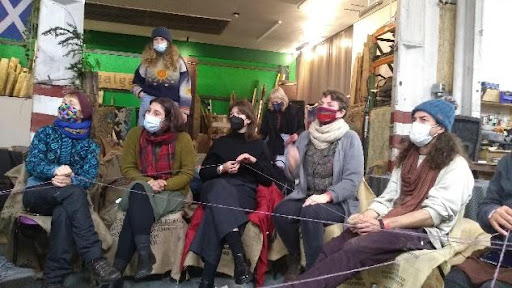Organising team: Dian Ekowati, Siti Maimunah, Alice Owen, Eunice Wangari, Rebecca Elmhirst (mentor)
The United Nations COP26 took place in Glasgow, UK in November 2021 and was the focus for our first FPE dialogue event series.
We invited the public, through the COP26 Peoples Summit for Climate Justice events programme, to join us to discover stories from Indonesia, Kenya and the UK which can be woven together to tell a bigger story about the making of climate colonialism, the logics of extractivism, and the ways communities resist and find alternatives. We shared stories which have come to us through our research with communities as part of the WEGO network for Feminist Political Ecology.
Through this FPE dialogue, we ask: what does the climate emergency look like in each of these places? How do frontline communities resist ‘false solutions’? Through a toxic tour, we juxtapose untold stories from riverine, forest, agrarian, pastoralist and suburban communities in West and Central Kalimantan (Indonesia), Kenya and the UK. These stories of everyday struggles for life may be overlooked, and therefore untold, in the drama of large-scale resistances. Alongside the tour, we invite those attending in person to join us in an open story-sharing space to gather and connect untold stories from elsewhere.
We also bring these stories to the United Nations COP26 Virtual Gender Marketplace to bring our FPE perspective into conversation with policy makers alongside bodies including IUCN, UN Women and others engaged with gender and the climate agenda.
WEGO-ITN members took part in three COP26 events:
Monday 8th November 2021, Untold Climate Stories: Extractivism, Colonialism and Community Alternatives: a virtual toxic tour. At COP26 Peoples’ Summit for Climate Justice
We invited audiences to join us online on a virtual ‘toxic tour’ as we weave together stories from the frontlines of extractivism and climate colonialism and explore how communities find everyday ways to resist. Our toxic destinations (in Indonesia, Kenya and the UK) each brought a situated perspective on the interplay between extractivist logics, climate emergency and colonialist responses. We tell these stories by addressing the erasure of and struggles for healthier, reciprocal ways of seeing and relating to the land, and by contrasting false solutions with practices enacted by communities on the frontline.
Monday 8th November: Extractivism, Colonialism and Community Alternatives: A Story Weaving Workshop.

Tuesday 9th November, United Nations COP26 Climate Conference Virtual Gender Market Place Poster presentation.
Recognizing and celebrating gender equality and the empowerment of women and girls in climate policy and action, Gender Day was held on Tuesday, 9 November 2021 at the United Nations COP26 Climate Conference. Following keynote addresses on gender equality in National Climate Action Plans, participants had the opportunity to create an avatar and explore the conference and networking space. This was designed by COP26 as an opportunity to connect with those who work on gender and climate change through combined web-based video calling and a 2-D virtual world that put together organizations active at the international, national, sub-national, regional or community level. We joined exhibitors to showcase our work and present our poster. Participants also had the chance to take part in the language cafés, dance floor (playlist available here) and poetry corner.
Specifically, our dialogue with COP26 policy makers and other visitors focused on Untold Stories from our research sites in Kenya, Indonesia and the UK (see poster below), and we discussed this work virtually with those who visited the poster and asked questions.
Posters from the event can be reviewed here.

You can check out the second part of the FPE Dialogues UK here:

